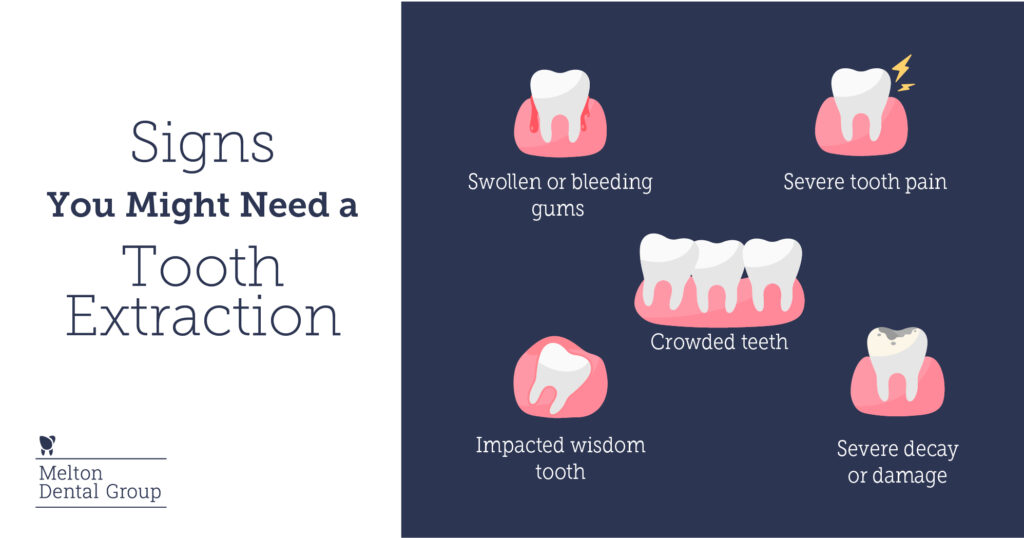Is It Normal to Have Fever After Tooth Extraction?
May 31, 2024

Tooth extraction – not the most thrilling prospect, right? A fever afterwards may probably be the last thing on your wishlist.
Here’s the thing, though, having a fever after tooth extraction is more common than you might think.
But we understand where your worries are coming from and all the concerns you may be having.
First things first? Take a deep breath.
At Melton Dental, we are here to guide you through it all. While you may have your reservations about tooth extraction, just know that it’s a common procedure we perform at our clinic. We are committed to making sure your experience is as pain-free and worry-free as possible.
Our experienced team has the know-how when it comes to tooth removal. So what do you say – let’s remove that troublesome tooth, shall we?

Fever after Tooth Extraction
A fever is your body’s way of reacting to the procedure, so having a slight fever after extraction is quite normal.
However, that doesn’t mean things can’t take a turn.
While a mild fever is normal, there are some red flags you shouldn’t ignore, like a fever over 38°C along with chills, aching joints and sweating.
If experiencing a fever is normal, you may be asking why this is a cause for concern. A high fever could be a warning sign of an infection, which, let’s admit, is the last thing you’d want to deal with post any procedure—dental or otherwise.
If you are at risk of an infection, you may also experience symptoms such as:
- Numbness
- Bleeding from the extraction site
- Difficulty breathing or swallowing
- Swelling that doesn’t go down
- Severe pain that doesn’t respond to pain medication
Sounds familiar? Then pick up your phone and give us a call. We will get your dental health back on track. Don’t delay because an infection is not something you want to mess around with.
What are the Possible Complications After Tooth Extraction?
In addition to having a fever after tooth extraction, other side effects may occur. These include:
Bleeding
Post-extraction, our dentist will place a small folded piece of gauze over the extraction site for you to gently bite down on. This will encourage a blood clot to form at the extraction site.
You can typically expect the bleeding to stop within 3-4 hours. However, if you notice minor bleeding in that first 24-hour window, that’s normal, too. Just grab some clean gauze, place it over the extraction site and gently bite down on it for about 30 minutes. This pressure will encourage blood clotting.
Sometimes, however, this blood clot can get dislodged. When that happens, you may experience persistent or heavy bleeding. Please contact our team at Melton Dental as soon as possible.
Pain
Pain and discomfort are also common side effects of tooth extraction, especially as the anaesthetic wears off. However, the severity of pain you may experience can vary. It is not a predictable factor, depending on the individual’s reaction to the procedure and pain tolerance.
You may either breeze through with minor pain and discomfort for a couple of days or find yourself dealing with more intense pain that lasts longer than you’d like.
After extraction, our dentist will prescribe pain relief meds for the first 2-3 days to help you manage the pain that comes your way. However, if you are pregnant or allergic to certain medications or NSAIDs (Non-Steroidal Anti-Inflammatory Drugs) like aspirin and ibuprofen, this might not be for you.
Swelling
Notice some puffiness around your mouth, cheeks or the sides of your face? It’s just your body doing its thing. Swelling is a natural response to injury or surgery like tooth extraction.
So don’t be surprised if you notice swelling.
This swelling can peak about 36-48 hours after extraction and gradually go down after 4-5 days. Along with swelling, your skin may change colour and take on a light bluish tinge. Once again, there’s no cause for alarm because it will fade away after a few days.
But if swelling and intense discomfort persist, don’t hesitate to consult one of our dentists.
Dry Socket
A dry socket could be the most painful of the possible complications that may arise post-tooth extraction. It happens when the blood clot formed over the extraction site gets dislodged, exposing the socket and underlying nerves, bones and soft tissue.
Symptoms of this condition include:
- Pain that radiates to your ear
- Bad breath
- A foul taste in your mouth
- Fever
- Visible bone in the extraction site
Don’t tough it out. Reach out to us! We will treat this condition, saving you from intense pain and the trouble of dealing with an infection.
Infection
An infection can occur when bacteria enter the extraction site and multiply on an open wound. Bleeding that lasts for more than 24 hours and pain that spikes up are indicators of infection.
When you leave our clinic, we will prescribe antibiotics for you to take at home to prevent or reduce the risk of infection.
However, if you experience any of these symptoms, you should seek medical attention ASAP since an infection can escalate quickly and pose a risk of sepsis.
What to Do After Tooth Extraction?
Aftercare post-tooth extraction is the key to recovering quickly and swiftly while avoiding extreme complications.
Wondering what you can do to manage these complications? Our dentists will provide detailed instructions on what you can do to prevent complications. These include:
- Avoid rinsing your mouth on the day of extraction to prevent dislodging the blood clot.
- Rest up. Your body needs it. Avoid physical or strenuous activities for 24 hours.
- Keep your head high (literally). Elevating your head when you lie down can reduce bleeding.
- Want a speedy recovery? Steer clear of smoking and alcohol (for at least 48 hours) because they will only delay healing.
- Eat soft foods like mashed potatoes, scrambled eggs and yoghurt. Unless specifically instructed by our dentist, you may resume your regular diet after about three days.
- Avoid hard, crunchy foods like chips or nuts, which could injure the extraction site.
- Chewing using the affected area(s) of your mouth for at least 24 hours post-extraction is a big no-no.
- Avoid using straws during the first 24 hours to avoid dislodging the blood clot.
- Control pain with prescribed pain meds. If pain persists or worsens, you know what to do – visit our clinic.
- Manage swelling by applying a cold compress to your cheek.
- If you have been prescribed any antibiotics, take them as directed by our dentist to prevent infection.
- Rinse your mouth gently with warm salt water the day after the surgery, every 3-4 hours. You can also do it after each meal.
- Brush your teeth to maintain oral hygiene. Be gentle to avoid aggravating the extraction site. You may notice some bleeding when brushing, but it’s normal and should stop.
- Mark your calendar for your follow-up appointment. We will be able to nip any complications in the bud.
If you follow our post-care instructions to the dot, you will be well on your way to a smooth recovery. And if you notice any unusual symptoms on your path to recovery, don’t hesitate to reach out to us!
At Melton Dental, your oral health, comfort, and recovery are important to us. Rest assured, we will be with you throughout your tooth extraction journey.





